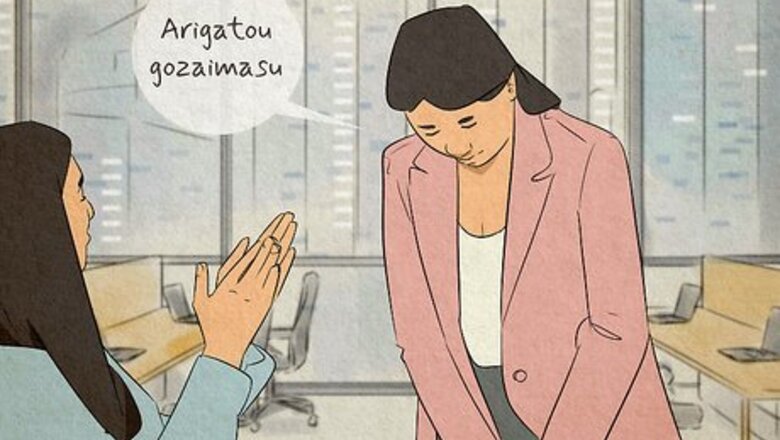
views
- Say arigatou gozaoimasu or domo arigatou gozaimasu in formal situations, such as at work or school, and when talking to people you don’t know.
- Use arigatou or domo to say thanks casually to close friends and family members.
- Say otsukare sama desu to your colleagues at work to thank them for their hard work.
Arigatou gozaimasu
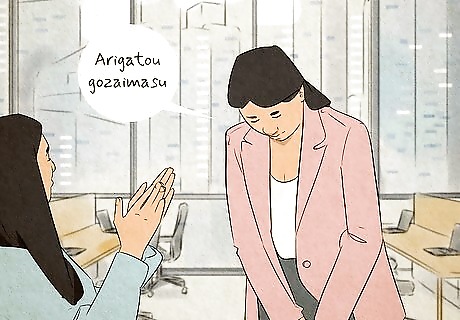
“Arigatou gozaimasu” is a polite way to say “Thank you.” You typically use this phrase in formal situations or with people you don’t know. Say this to people who have a higher status than you, such as your boss, teacher, or anyone who appears to be older than you. Or, use this phrase to express heartfelt gratitude to someone close to you. Pronunciation: ah-ree-gah-toh goh-zah-ee-mahs Written in Japanese: ありがとうございます When someone thanks you, reply with dou itashi mashite (doh ee-tah-shee mah-she-teh, どういたしまして) to say “You’re welcome” in both formal and casual situations.
Domo arigatou gozaimasu
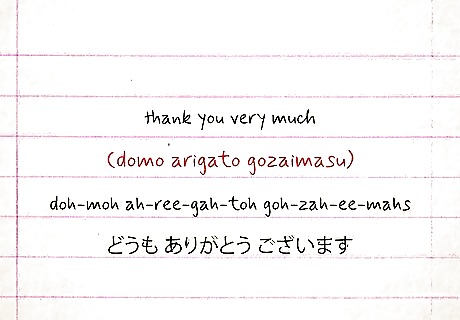
“Domo arigato gozaimasu” means “Thank you very much.” This phrase adds an extra level of politeness to just your standard “Thank you.” Say this when you’re in a formal setting, such as in your office, at school, or interacting with people who are older or in a higher position than you. Or, use this phrase to express sincere thanks to someone you’re close with. Pronunciation: doh-moh ah-ree-gah-toh goh-zah-ee-mahs Written in Japanese: どうも ありがとう ございます
Arigatou gozaimashita
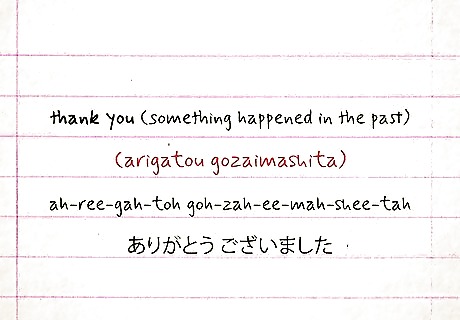
“Arigatou gozaimashita” expresses thanks in the past tense. You use this phrase when you’re thanking someone for something that happened in the past or is already completed. For example, if you just got a massage, you would say arigatou gozaimashita to the masseuse for the service they provided. It has the same meaning as arigatou gozaimasu, but is just in the past tense. Pronunciation: ah-ree-gah-toh goh-zah-ee-mah-shee-tah Written in Japanese: ありがとう ございました
Hontoni arigatou gozaimasu
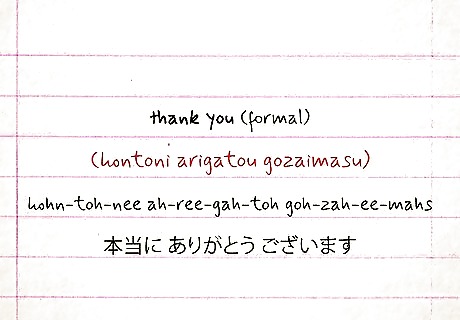
“Hontoni arigatou gozaimasu” is the most formal way to say “Thank you.” Use this phrase when you want to express sincere gratitude to someone in a very polite way. This is like saying, “I am truly grateful.” People don’t use this expression that often, but if you think the situation calls for a deeper expression of gratitude, go ahead and use it. It’s common to also pair saying hontoni arigatou gozaimasu with a bow. Pronunciation: hohn-toh-nee ah-ree-gah-toh goh-zah-ee-mahs Written in Japanese: 本当に ありがとう ございます
Haisha moushiagemasu
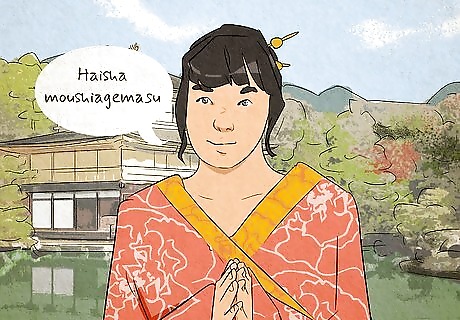
“Haisha moushiagemasu” is a humbling way to thank someone. When you say this phrase, it’s usually when you’re thanking someone who is older than you or someone who has a higher rank than you, such as your boss. This phrase sounds very humble and is a way to intentionally place yourself lower than the person you’re talking to. This is good for formal situations. Pronunciation: ha-ee-shah moh-shee-ah-geh-mas Written in Japanese: 拝謝申し上げます
Sumimasen
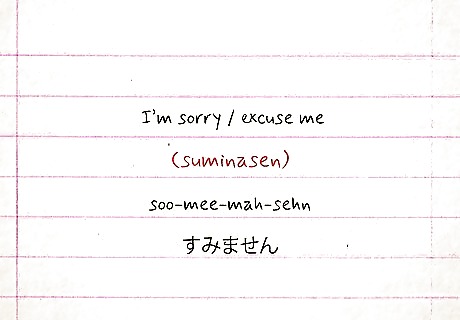
“Suminasen” translates as “I’m sorry” or “Excuse me.” Many Japanese phrases of gratitude also include an apology as a way to thank someone for putting their time and effort into something. Use suminasen in formal situations, such as when you’re at work or doing business with someone. When you use this phrase, you’re essentially saying, “Thank you for doing this despite the inconveniences it may have caused.” Pronunciation: soo-mee-mah-sehn Written in Japanese: すみません
Osoreirimasu
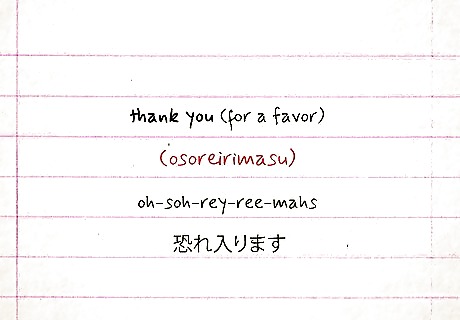
“Osoreirimasu” is a formal way to thank someone for a favor. This phrase is often used in business settings and is usually someone’s way of thanking another person for a favor or service they provided. This is a stronger version of suminasen and is usually translated as, “I’m deeply sorry.” Even though it sounds apologetic, people use it to express feelings of deep gratitude. Pronunciation: oh-soh-rey-ree-mahs Written in Japanese: 恐れ入ります
Arigatou
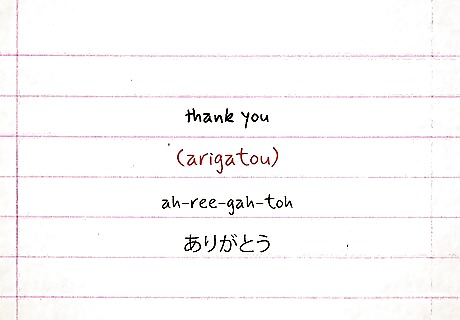
“Arigatou” is a casual way to say “Thank you.” Use this phrase when you’re with close friends who are the same age as you, your family, or small children. Avoid using this phrase when talking with strangers or acquaintances who are older than you or when you’re in formal settings, such as your place of work or school. Pronunciation: ah-ree-gah-toh Written in Japanese: ありがとう When someone says arigatou to you, reply with iie (ee-yeh, いいえ) to say, “No problem.” Iie literally translates as “No.”
Domo arigatou
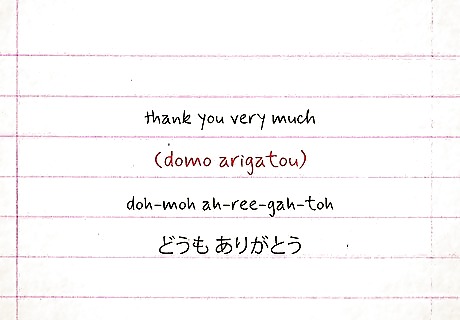
“Domo arigatou” is a casual way to say “Thank you very much.” Only use this expression when you’re with close friends who are your age or family members. Avoid using this phrase in formal situations or with strangers. If you don’t know the other person or they’re older than you, use domo arigatou gozaimasu instead. Pronunciation: doh-moh ah-ree-gah-toh Written in Japanese: どうも ありがとう
Domo
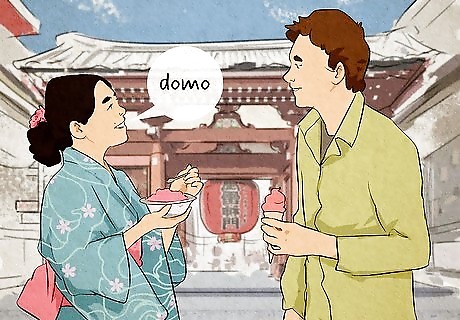
“Domo” is a quick and casual way to say “Thanks.” Domo is actually an adverb that’s often used to emphasize other phrases, such as in domo arigatou to mean “Thank you very much,” or domo suminasen which means “I’m very sorry.” On its own, domo can mean “Thanks,” “Hi/Hey,” or “Sorry” depending on the context. Only use this expression with people you’re close with. Pronunciation: doh-moh Written in Japanese: どうも
Sankyu

“Sankyu” is the English “Thank you” said with Japanese pronunciation. This is another casual way to say “Thank you” to your close friends. Since it’s a word borrowed from English, be sure to only use this in informal situations and avoid saying this to your boss, teacher, or people you don’t know that well. Pronunciation: san-kyu Written in Japanese: サンキュー
Azasu
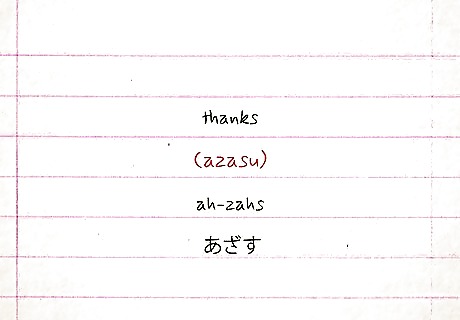
“Azasu” is a slang term that means “Thanks.” Azasu is a super shortened form of arigatou gozaimasu. Like most slang expressions, only say this when you’re with your friends or family members and be sure to avoid using it in formal settings. Pronunciation: ah-zahs Written in Japanese: あざす
Ookini
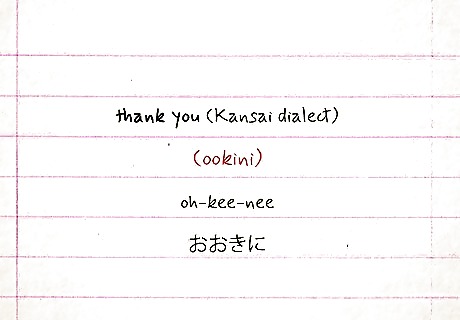
“Ookini” means “Thank you” in the Kansai dialect. This phrase isn’t a standard Japanese phrase. Instead, this form of saying “Thank you” is only found in or near Osaka. Saying ookini is like saying arigatou, so only use it in informal situations with close friends or family. Pronunciation: oh-kee-nee Written in Japanese: おおきに
Otsukare sama desu
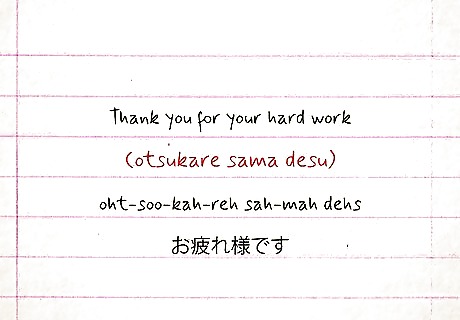
“Otsukare sama desu” means “You’ve worked hard.” This is a common phrase people use at work as a greeting to colleagues. It’s a phrase that basically means, “Thank you for your hard work.” If someone did a good job on a presentation or they’ve just had a long day, be sure to thank them for all of the efforts they put in by using this phrase. Pronunciation: oht-soo-kah-reh sah-mah dehs Written in Japanese: お疲れ様です Or, say otsukare sama deshita (oh-tsoo-kah-reh sah-mah de-shee-ta, お疲れ様でした) at the end of the day. This phrase has the same meaning as otsukare sama desu, but it’s in the past tense.
Kansha shimasu
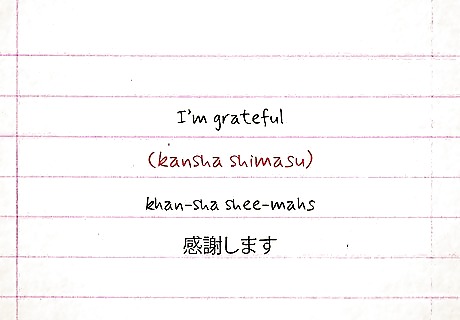
“Kansha shimasu” means “I’m grateful.” This is a way to express your gratitude other than explicitly saying “Thank you.” Kansha means “gratitude,” and shimasu turns it into the verb “to be grateful.” You’re more likely to use this expression in writing rather than speaking, like when you’re writing an email. A casual way to say this would be kansha suru (kahn-sha soo-roo, 感謝する). Pronunciation: khan-sha shee-mahs Written in Japanese: 感謝します
Itadakimasu
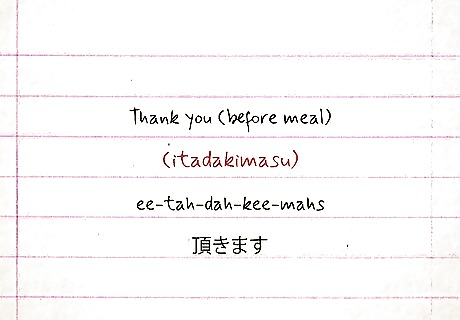
Use “itadakimasu” to thank someone before a meal. When someone cooks you a delicious meal, be sure to say this phrase before you start eating to thank them for their hard work and for the food they’ve given you. This expression literally means, “I hungrily accept.” Pronunciation: ee-tah-dah-kee-mahs Written in Japanese: 頂きます
Gochisou sama deshita
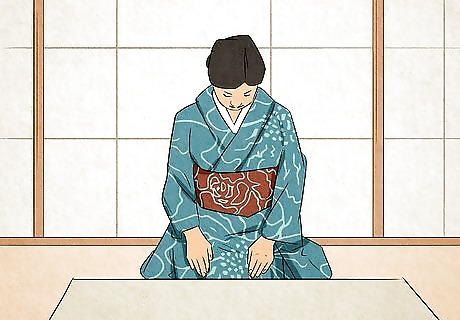
Say “gochisou sama deshita” to thank someone after a meal. If a host serves you dinner or if someone treats you to a meal, use this phrase when you’ve finished eating to express gratitude. A more casual way to say this between close friends and family is gochisou sama (go-chee-soh sah-mah, ごちそうさ). Pronunciation: go-chee-soh sah-mah de-shee-ta Written in Japanese: ごちそうさまでした




















Comments
0 comment